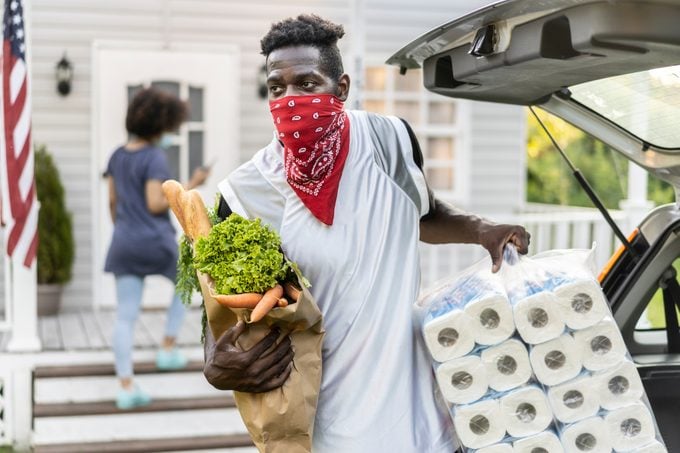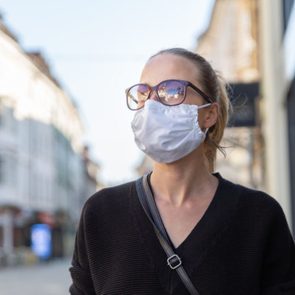Surprising Ways America’s Health Has Changed During Covid-19
Updated: Mar. 30, 2022
The Covid-19 pandemic is changing the health of Americans in surprising ways, from a possible milder flu season to increased infidelity.
Coronavirus and health behavior
The Covid-19 pandemic is still in full swing with the number of coronavirus cases around the world increasing daily. Although there’s still a lot that’s unknown about the virus, experts are starting to notice some surprising trends in how the pandemic is changing our health behavior.
The measures taken by federal and local leaders to mitigate the pandemic have led to systemic and behavioral changes that are having a ripple effect on public health, says Rajeev Fernando, MD, an infectious diseases specialist and director of the Division of Infectious Diseases at Stony Brook Southampton Hospital in Southampton, New York.
“It turns out that washing hands, social distancing, and wearing face masks—when done together—can have a big impact on not just the coronavirus, but on people’s health overall,” says Carol Winner, a public health expert who has worked with the Centers for Disease Control and Prevention (CDC) and the National Institutes of Health for more than 30 years.
Here are a few ways our panel of health experts suggest Covid-19 is influencing our health—for better, for worse.
Better: The possibility of a milder flu season
With the start of the flu season, the threat of a “twindemic” is very real, says Dr. Fernando, who founded CHIRAJ, a global health charity, and the #maskupearth campaign to help stop the spread of Covid-19 worldwide.
Every year, tens of thousands of people die from flu-related complications in the United States. Combined with Covid-19 fatalities—both of which often start with similar symptoms—the results could be devastating, he says. And it’s possible to get both viral illnesses at the same time.
However, there’s reason to be hopeful. “We base our predictions for the flu season off of what happens during the winter in the southern hemisphere,” says Dr. Fernando. “This year, Australia experienced a very mild flu season.” Indeed, early flu activity in the United States is low, according to the CDC.
This could be due to a number of factors, including the strains of the influenza virus circulating this year. But it seems likely that the pandemic has played a part, too. The measures that are being used to slow the spread of Covid-19—wearing masks, washing your hands, social distancing—also help reduce the flu. Both spread in a similar way, says Dr. Fernando. “It’s still very important to get your flu shot,” he’s quick to add. Unfortunately, the flu shot does not protect against Covid-19 (they’re different viruses). Learn what else you need to do to prepare for a coronavirus winter.
Better: Reduced rates of stomach bugs
All the emphasis on hand sanitizing and overall cleanliness may very well lessen other common viral and bacterial infections in the United States, such as those that cause the stomach flu, Winner says. Everything from gastrointestinal viruses to pink eye to the common cold can be reduced or even prevented through the increase in sanitary precautions people are using for Covid-19, she says. (Need help avoiding infection? Use this coronavirus cleaning guide.)
Worse: Increased infidelity and STDs
The pandemic may be putting couples at increased risk for experiencing infidelity, according to a report published in July 2020 in Family Process. Even though quarantine presumably kept people apart, about 25 percent broke quarantine for sex and alternate methods for cheating surged. For example, in the study, one dating site for married people reported adding 17,000 new members per day during the pandemic. That’s an increase of 1,500 new members per day from 2019.
Rates of sexually transmitted diseases (STDs) have also been on the rise but testing dropped dramatically during the pandemic, likely due to people not having access to clinics and other testing facilities, according to the CDC. People who don’t know they have an STD are more likely to spread it to others. Oh, and yes, you can get coronavirus through sex.
Better: Increased volunteering and helping others
The coronavirus pandemic has led to an increase in volunteering in recent months. LinkedIn members in the United States added more than 110,000 volunteer activities to their profiles each month, more than twice the rate in 2017, according to data from the social media company. And that’s just the official ones people remembered to add.
To be sure, the pandemic has inspired people to rise to the occasion, checking on neighbors, delivering meals, donating blood, grocery shopping for the elderly, giving to food banks, Winner says. “It’s really brought people together in a way nothing else has,” she says. And volunteering doesn’t just help them, it helps you too, providing powerful mental and physical health benefits.
Worse: Rising rates of substance abuse
Overall, 2020 has been rough on America’s mental health. But you can particularly see a direct effect in rising rates of drug and alcohol abuse, Dr. Fernando says. As of the end of June 2020, 40 percent of adults in the United States reported struggling with mental health or substance abuse, according to the CDC. People are under immense stress and have been cut off from their normal avenues of support and treatment, leading to new abuse disorders or relapses of old ones, he says. This may also play a part in the documented rise in domestic abuse cases during the pandemic.
Better: A burst of new health-focused technologies
Health tech is still a young industry. But thanks to smartwatches, phone apps, and many types of online health platforms, we have more ways than ever to monitor, assess, and improve our health. Innovation has skyrocketed during the pandemic partly because researchers have a real-life testing space, Winner says. There are some downsides to becoming even more tech-dependent than we already are. But it’s changing our health behavior in exciting ways, as well.
Contact tracing
Contact tracing, for instance, can be a laborious process that can take days of sleuthing and calling to figure out who, when, and how people get exposed to the virus. Now, thanks to a slew of new apps, you can find out within hours if you’ve been near someone who was exposed and then guided as to what to do next. In the United States, we aren’t taking full advantage of this technology yet, but results in other countries are promising.
There are also new apps to help you monitor and evaluate symptoms, find nearby testing locations, and meet with your doctor through telehealth. Other apps are designed to entertain you during quarantine, monitor your sleep and vital signs, and get healthy food delivered to your door.
Will all this new data improve our health and inspire us to make better decisions? It remains to be seen but so far it seems promising, Winner says.
Better: More awareness about public health and safety
“This collective experience has brought public health to the forefront in a way nothing else has in recent memory,” Winner says. “It has really shown people how much their individual actions regarding their health—mask wearing, social distancing, quarantining—affect the health of everyone around them and society as a whole.”
Take, for example, masks. Wearing a mask protects others more than yourself, so for maximum benefit, everyone needs to wear one, Dr. Fernando says. While this message seems to be getting through to most people, it’s not as widely followed as experts would like. “Unfortunately, mask wearing has become a political issue,” he says. “It shouldn’t be. It’s a public health issue.”




















